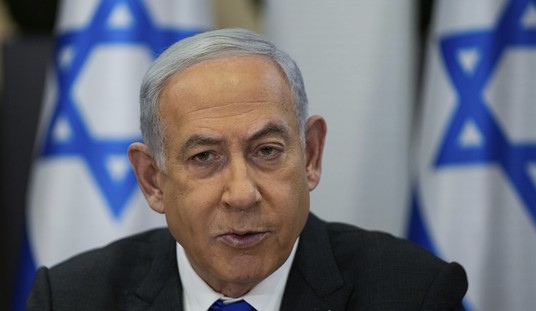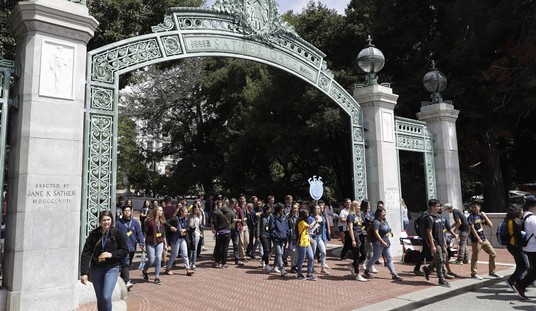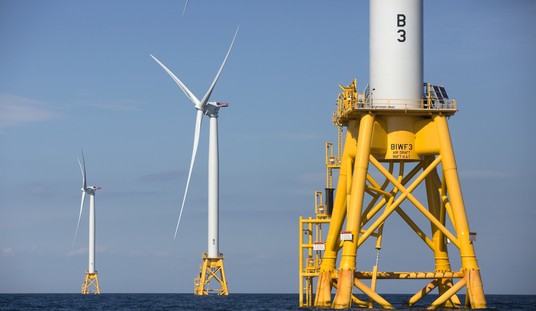Man alive. You don’t see trend lines like this every day.

I guess the spin for O fans is obvious. The sudden spike isn’t a “real” downturn in his counterterror approval, it’s just a reflex after the jihadi massacre in San Bernardino. Support for gun control bounced upward after the Sandy Hook shooting in 2012 but it came back down to earth in time. So will this, provided there isn’t another attack in the U.S. soon. Could be, but Obama’s been trending poorly on this subject for two years, ever since ISIS started creeping onto American voters’ radar. It was probably the beheadings of James Foley and Steven Sotloff last year that finally made this a net zero issue for him; a year of drift in the air campaign in Syria and now the shooting in San Bernardino have made it sharply net negative. Some military success against ISIS might turn this around for him, and by “him” I mean “Democrats,” but I don’t know if anything else will, especially with disastrous retail politics at work like Obama lecturing Americans for worrying about Syrian refugees. If he announced tomorrow that the FBI had foiled a major domestic terror plot, would people treat that as evidence that the feds are on the case or as evidence that the threat really is greater now on Obama’s watch than it’s been since 9/11?
Another fascinating graph from the same Pew poll, and further evidence of how ISIS’s rise in 2014 is moving opinion on lots of things:

It’s amazing to see how similar opinion was across parties as recently as a year after 9/11. Since then, Democrats have barely budged, and show lower levels of suspicion towards Islam now than they have at various points since 2002. Republicans, meanwhile, have more than doubled in number and are now at an all-time high. There’s not a huge “Obama effect” either: Until 2014, GOPers were only a bit more suspicious of Islam since 2009 than they’d been for most of Bush’s presidency. This is more about perceptions of Islam’s role in driving terrorism than it is about a guy from the other party leading the counterterror effort. No surprise then that when both sides are asked whether Muslims deserve more counterterror scrutiny because of their religion, Republicans split 49/44 while Democrats split, er, 20/76.
One more graph for you. What should we title this one? “The end of the libertarian moment”? “The decline and fall of Snowdenism”? “Rand Paul’s presidential disaster in one image”?

Snowden exposed the PRISM program in the summer of 2013, driving concerns about civil liberties vis-a-vis counterterrorism waaaay up. Two-plus years later, the number who say the government hasn’t gone far enough to protect the country is not only once again a majority but approaching a 12-year high. It’s Republicans who are driving it too, with 71 percent saying the feds haven’t gone far enough versus 54 percent of Democrats (a notable majority in its own right). If you’ve been wondering why Rubio keeps coming after Ted Cruz for voting to replace the Patriot Act with the USA Freedom Act, that’s why. And that’s just one way in which GOPers have reverted to hawkish form. When Americans are asked whether they worry that the U.S. won’t do enough to stop jihadis in Iraq and Syria or will go too far in getting involved there, Republicans split 75/18(!) while Democrats split 31/66. Those are vintage 2005 numbers on Middle East intervention. Ask Americans if they support using ground troops in Iraq and Syria and Democrats split 33/64 against. Republicans? 66/28 in favor. In theory that should help the superhawk interventionist, Marco Rubio. In reality, at least so far, it’s helping the Jacksonians Trump and Cruz. Pew should have followed up by asking people how they feel about U.S. troops staying put for awhile while Syria rebuilds. I’ll bet that’s where we’d see more clear-cut support for the Trump/Cruz “bomb and go home” position than for Rubio’s neoconservatism.
By the way, when the parties are asked to rate various threats to the United States, the one with the strongest Republican tilt is Iran’s nuclear program. Seventy-nine percent of GOPers see that as a major threat versus 52 percent of Democrats. The threat with the strongest Democratic tilt? You guessed it: It’s climate change. Just 22 percent of Republicans call that “major.” Among Democrats, 73 percent do.







Join the conversation as a VIP Member